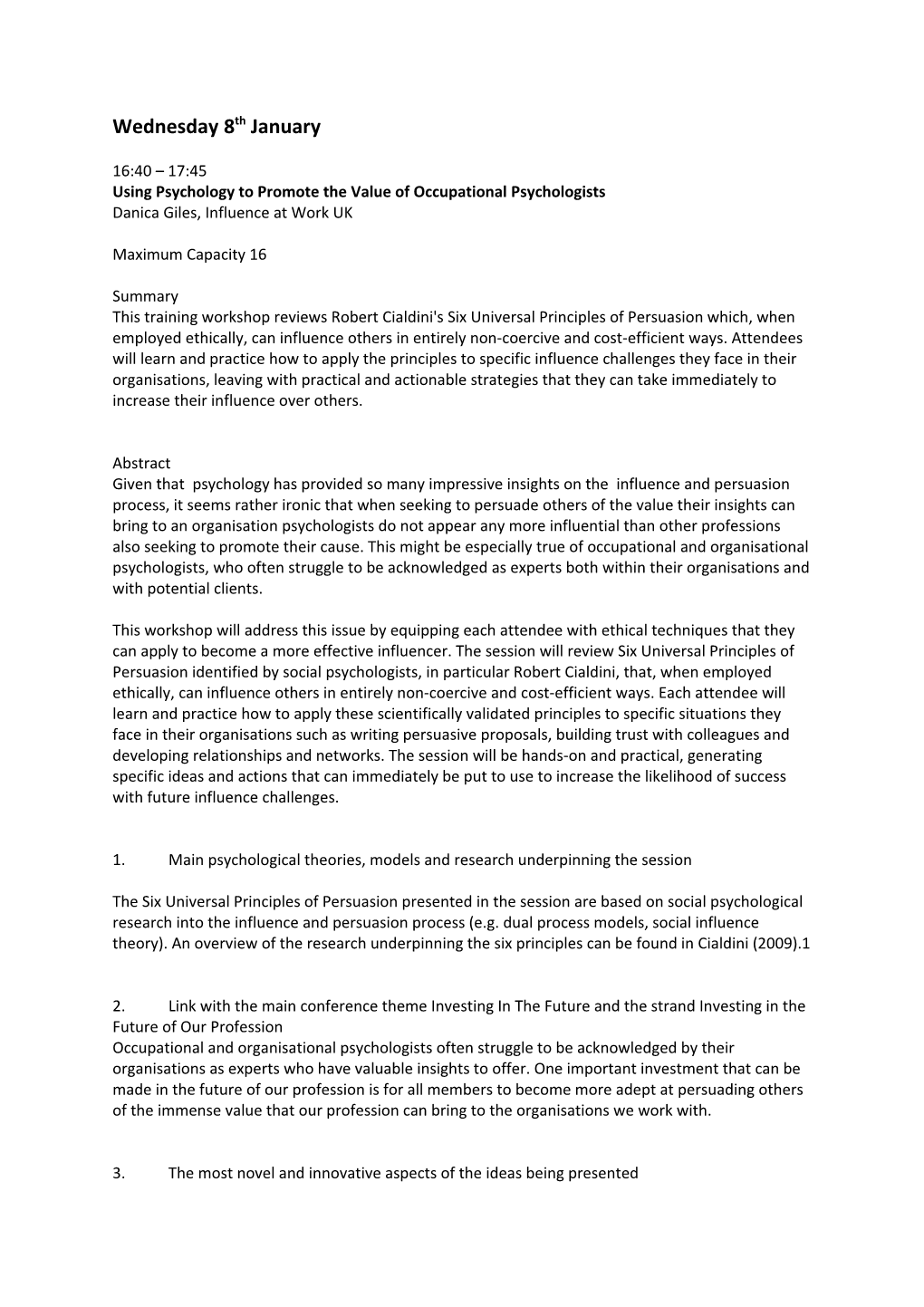Wednesday 8th January
16:40 – 17:45
Using Psychology to Promote the Value of Occupational Psychologists
Danica Giles, Influence at Work UK
Maximum Capacity 16
Summary
This training workshop reviews Robert Cialdini's Six Universal Principles of Persuasion which, when employed ethically, can influence others in entirely non-coercive and cost-efficient ways. Attendees will learn and practice how to apply the principles to specific influence challenges they face in their organisations, leaving with practical and actionable strategies that they can take immediately to increase their influence over others.
Abstract
Given that psychology has provided so many impressive insights on the influence and persuasion process, it seems rather ironic that when seeking to persuade others of the value their insights can bring to an organisation psychologists do not appear any more influential than other professions also seeking to promote their cause. This might be especially true of occupational and organisational psychologists, who often struggle to be acknowledged as experts both within their organisations and with potential clients.
This workshop will address this issue by equipping each attendee with ethical techniques that they can apply to become a more effective influencer. The session will review Six Universal Principles of Persuasion identified by social psychologists, in particular Robert Cialdini, that, when employed ethically, can influence others in entirely non-coercive and cost-efficient ways. Each attendee will learn and practice how to apply these scientifically validated principles to specific situations they face in their organisations such as writing persuasive proposals, building trust with colleagues and developing relationships and networks. The session will be hands-on and practical, generating specific ideas and actions that can immediately be put to use to increase the likelihood of success with future influence challenges.
1.Main psychological theories, models and research underpinning the session
The Six Universal Principles of Persuasion presented in the session are based on social psychological research into the influence and persuasion process (e.g. dual process models, social influence theory). An overview of the research underpinning the six principles can be found in Cialdini (2009).1
2.Link with the main conference theme Investing In The Future and the strand Investing in the Future of Our Profession
Occupational and organisational psychologists often struggle to be acknowledged by their organisations as experts who have valuable insights to offer. One important investment that can be made in the future of our profession is for all members to become more adept at persuading others of the immense value that our profession can bring to the organisations we work with.
3.The most novel and innovative aspects of the ideas being presented
One of the most novel and innovative (and even motivating) aspects of the ideas being presented in this workshop is how small changes informed from persuasion science can lead to big differences in effectiveness. Equally important for this audience is the fact that these small changes are informed not from best practices or simple guesses but instead from a body of social psychological research conducted over the last six decades.
4.Aspects of the session conference delegates and the wider public might find most informative and stimulating
The aspects that I believe delegates will find most informative and stimulating are that these small changes do not require the investment of additional resources or a change in strategy but instead small shifts of words used in a proposal, the timing of a request, or a simple contextual or environmental shift when delivering a message. Our profession is continually being challenged to show its ROI. This session will prove how even a basic understanding of persuasion science can significantly deliver more ‘R’ for much less ‘I’.
5.Materials for attendees
Attendees will be given a credit card sized tip card summarizing the six principles as well as giving access to further free online resources such as video animations, podcasts and reports.
Duration / 60 minutesStructure/Agenda / -An overview of the Six Principles of Persuasion (30 min)
-Small group exercises where attendees get to discuss and consider how
- the principles could be employed to common influence and persuasion
-challenges (10min)
-Attendees then take part in a wider discussion/debate sharing
-immediate ideas and first thoughts which can be summarized and
- circulated afterwards (20 min)
Number of attendees / minimum: 8; optimum: 16; maximum: 20
Physical requirements / Preferred room layout: cabaret style for groups of 4 to 6 Equipment required: projector, screen, flipchart
Learningobjectives and outcomes for attendees / -Understand the Six Universal Principles of Persuasion
-Understand how they apply to a variety of persuasion challenges faced by occupational and organisational psychologists
-A list of practical actions attendees can take away and apply to
future influence challenges
Specific content to be taught / -The Six Universal Principles of Persuasion are a set of judgmental heuristics that influence decisions and behaviour.
-They are
oreciprocity (we feel obligated to return favours performed for us),
oauthority (we look to experts to show us the way),
oconsistency (we want to act consistently with our
commitments and values),
oscarcity (the less available the resource, the more we want
it),
oliking (the more we like people, the more we want to say
yes to them),
osocial proof (we look to what others do to guide our
behaviour).
-Each principle will be illustrated with an example study from an
organisational context.
Teaching and learning methods / -Presenter-led review of the six principles, illustrated with
-examples from studies
-Consolidation through discussion and application to familiar
-contexts
Target audience / Anyone can profit from these insights
Level of expertise aimed at / Basic
Recognised certification or accreditation / No
